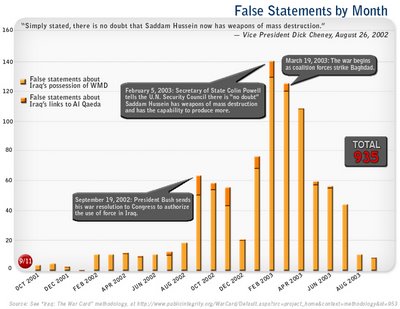The FCC has slapped CBS with millions of dollars in fines for broadcasting "indecent" content. First, there was the Janet Jackson wardrobe malfunction at the 2004 Superbowl which cost the network $550,000. Last year, the commission handed down more than $3 million in fines for a teen orgy depicted in an episode of"Without a Trace." Just this week, the FCC announced its intent to fine CBS another $1.43 million for a bit of skin shown on a 2003 episode of "NYPD Blue."
None of these scenes were particularly graphic. Janet Jackson's exposed (and pierced) breast was allegedly shown by accident, the teen orgy was mostly blurred images of swaying bodies, and the semi-nude scene in "Blue" depicted a small boy getting a bathroom glimpse of a grown woman. Indecent? This wasn't pornography. And it wasn't indecent unless you consider breasts indecent, or story lines that deal with real-life issues. Yes, teenagers sometimes have orgies. The fictional orgy in question, by the way, resulted in consequences. And the bathoom scene in "Blue" was similarly well done.
But even if these fictional scenes hadn't been skillfully executed, the FCC has overstepped its bounds. It is now acting as a story and content editor for CBS, and it has a big stick. Of course, the FCC is bowing under pressure from "decency" groups that would like to ban breasts -- and apparently all depictions of youthful sexuality -- from the air.
It's unfortunate that the FCC has chosen this issue to put its considerable resources behind. The commission is responsible for protecting the public from far more than the occasional breast, and what I find truly indecent is the amount of advertising aimed at children. That type of advertising is banned, with good reason, in most of the world. Apparently, the FCC is dedicated to helping advertisers produce a generation of consumers while giving lip service to the idea of decency.
But judge for yourself. The offending scenes are offered below.
Wednesday, January 30, 2008
Monday, January 28, 2008
A thousand lies
 The Bush Administration lied 935 times in a "carefully orchestrated campaign of misinformation" in the runup to the invasion of Iraq, a new investigation by the Center for Public Integrity has concluded.
The Bush Administration lied 935 times in a "carefully orchestrated campaign of misinformation" in the runup to the invasion of Iraq, a new investigation by the Center for Public Integrity has concluded.I'll save the rant.
But while we're on the topic, 60 Minutes had an interview with the guy who debriefed the captive Saddam Hussein before he was turned over to the Iraqis (and executed). Saddam said there were no WMDs, of course. But what I found troubling is that the FBI agent lied to Saddam on a daily basis for months to get the information. Not only did he pretend to be his friend, but he presented himself not as an FBI agent but as someone who was reporting directly to the president, and held charades to reinforce this impression. The FBI has touted the debriefing as among the top achievements in the agency's 100-year history. Sorry, but isn't it immoral to lie to a man you know will be put to death? But what I found particularly repugnant was that the FBI agent feigned admiration for Saddam's poetry in order to win his confidence. To lie is low, but to lie about literature is a sin.
A long time ago in a land far away, there was a long-held standard that the FBI did not operate overseas and that CIA did not operate domestically. The principle was to keep the FBI from meddling in foreign affairs and the CIA from spying on our own people. Well, we've crossed that Rubicon.
Wednesday, January 9, 2008
The author is always the last to know...
 To coincide with the release of INDY IV, Random House is reissuing all four of my Indiana Jones adventures. IJ AND THE PHILOSPHER'S STONE and IJ AND THE DINOSAUR EGGS will be available April 19 (a date that readers of my thrillers will recognize). IJ AND THE HOLLOW EARTH and IJ AND THE SECRET OF THE SPHINX will follow. I didn't have a clue until a colleague came to my office and said she was trying to get copies of the IJ novels for her students but was having trouble... I looked at her blankly, said they are typically available, and then went to the Internet. Found a fansite that said RH was republishing them. Then went to the Random House website and found their catalog and confirmed it. Really, would it have killed somebody in NY to have called and told me? By the way, if you want to read about Indy's first encounter with the Crystal Skull, read PHILOSOPHER'S STONE. The Skull is a continuing story through all four books, ending with SPHINX, the last original Indy novel. The only change in the books is the price, I believe. They are now $7.50.
To coincide with the release of INDY IV, Random House is reissuing all four of my Indiana Jones adventures. IJ AND THE PHILOSPHER'S STONE and IJ AND THE DINOSAUR EGGS will be available April 19 (a date that readers of my thrillers will recognize). IJ AND THE HOLLOW EARTH and IJ AND THE SECRET OF THE SPHINX will follow. I didn't have a clue until a colleague came to my office and said she was trying to get copies of the IJ novels for her students but was having trouble... I looked at her blankly, said they are typically available, and then went to the Internet. Found a fansite that said RH was republishing them. Then went to the Random House website and found their catalog and confirmed it. Really, would it have killed somebody in NY to have called and told me? By the way, if you want to read about Indy's first encounter with the Crystal Skull, read PHILOSOPHER'S STONE. The Skull is a continuing story through all four books, ending with SPHINX, the last original Indy novel. The only change in the books is the price, I believe. They are now $7.50.
Tuesday, January 8, 2008
Paging Doctor Bombast
"It's true people sometimes need to be placed under involuntary mental health treatment because they can't take care of themselves," veteran psychiatrist Dr. Jeffrey Sugar said of the 26-year-old Spears. "But there's a difference between being detained involuntarily for psychological treatment and being forced to endure Dr. Phil involuntarily." -- from an AP story about Dr. Phil McGraw's uninvited visit to Brittany's hospital room.
Thursday, January 3, 2008
New law won't change fed secrecy policy
You may have read (here and elsewhere) about the OPEN Government Act, a new law which makes several important changes to the Freedom of Information Act. It is meant to encourage better response times, allow requests to be tracked, and expand the basis for fee waivers. But what it doesn't do, according to the FAS Project on Government Secrecy, is to restore the "presumption of openness" that was demolished by John Ashcroft.
That provision was removed from the bill's final form.
From Steven Aftergood's Secrecy News:
Whatever records that a government agency was legally entitled to withhold before enactment of the "OPEN Government Act" can still be withheld now that the President has signed it.
Some reporters and editorial writers, perhaps enchanted by the name of the new law, mistakenly assumed that it accomplishes much more than that. "The law ... restores a presumption of a standard that orders government agencies to release information on request unless there is a finding that disclosure could do harm," according to a January 1 Associated Press account that appeared in the Washington Post, the New York Times, USA Today, the Wall Street Journal and elsewhere.
Further, the widely-published AP account continued, "The legislation is aimed at reversing an order by former Attorney General John Ashcroft after the 9/11 attacks in which he instructed agencies to lean against releasing information when there was uncertainty about how doing so would affect national security."
But that is incorrect.
Although the original House version of the OPEN Government Act did include a provision that would have repealed the Ashcroft policy and established a "presumption of openness," that provision was removed from the bill prior to passage.
Thus, Rep. Henry Waxman (D-CA) noted with regret on the House floor on December 18 that the final legislation "does not include a provision which I thought was a key one establishing a presumption that government records should be released to the public unless there is a good reason to keep them secret."
That provision was removed from the bill's final form.
From Steven Aftergood's Secrecy News:
Whatever records that a government agency was legally entitled to withhold before enactment of the "OPEN Government Act" can still be withheld now that the President has signed it.
Some reporters and editorial writers, perhaps enchanted by the name of the new law, mistakenly assumed that it accomplishes much more than that. "The law ... restores a presumption of a standard that orders government agencies to release information on request unless there is a finding that disclosure could do harm," according to a January 1 Associated Press account that appeared in the Washington Post, the New York Times, USA Today, the Wall Street Journal and elsewhere.
Further, the widely-published AP account continued, "The legislation is aimed at reversing an order by former Attorney General John Ashcroft after the 9/11 attacks in which he instructed agencies to lean against releasing information when there was uncertainty about how doing so would affect national security."
But that is incorrect.
Although the original House version of the OPEN Government Act did include a provision that would have repealed the Ashcroft policy and established a "presumption of openness," that provision was removed from the bill prior to passage.
Thus, Rep. Henry Waxman (D-CA) noted with regret on the House floor on December 18 that the final legislation "does not include a provision which I thought was a key one establishing a presumption that government records should be released to the public unless there is a good reason to keep them secret."
Subscribe to:
Comments (Atom)